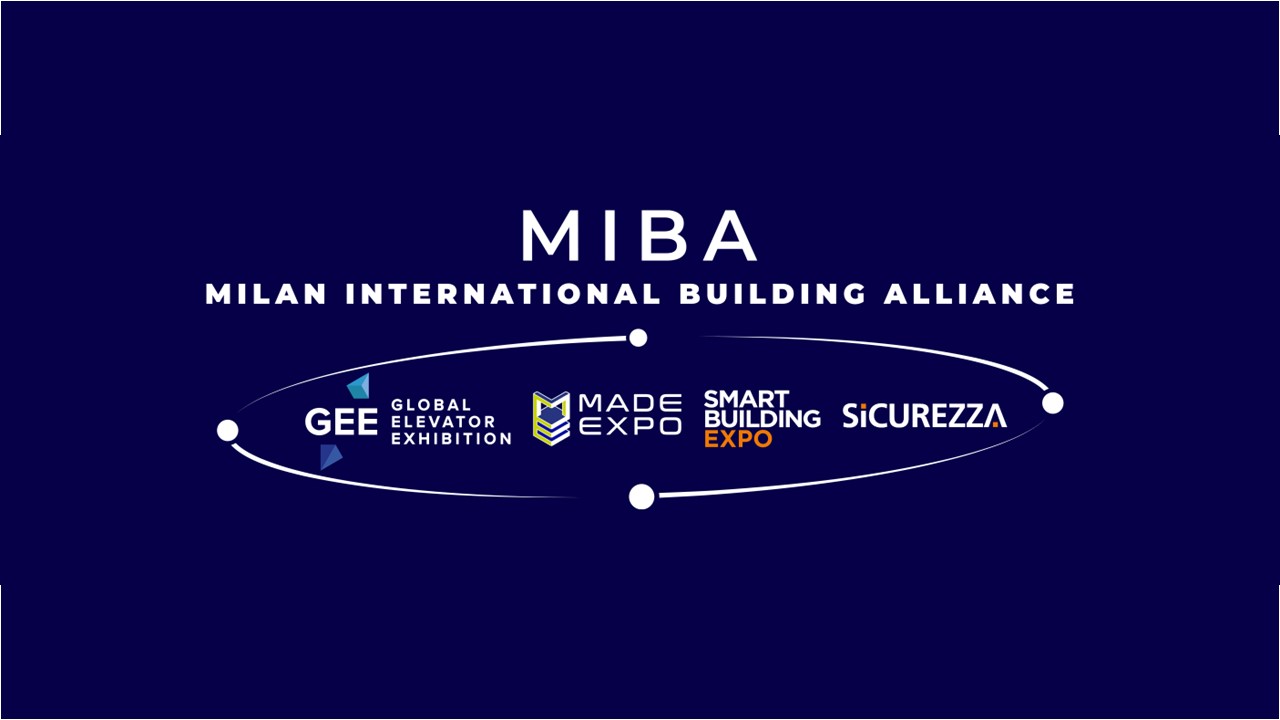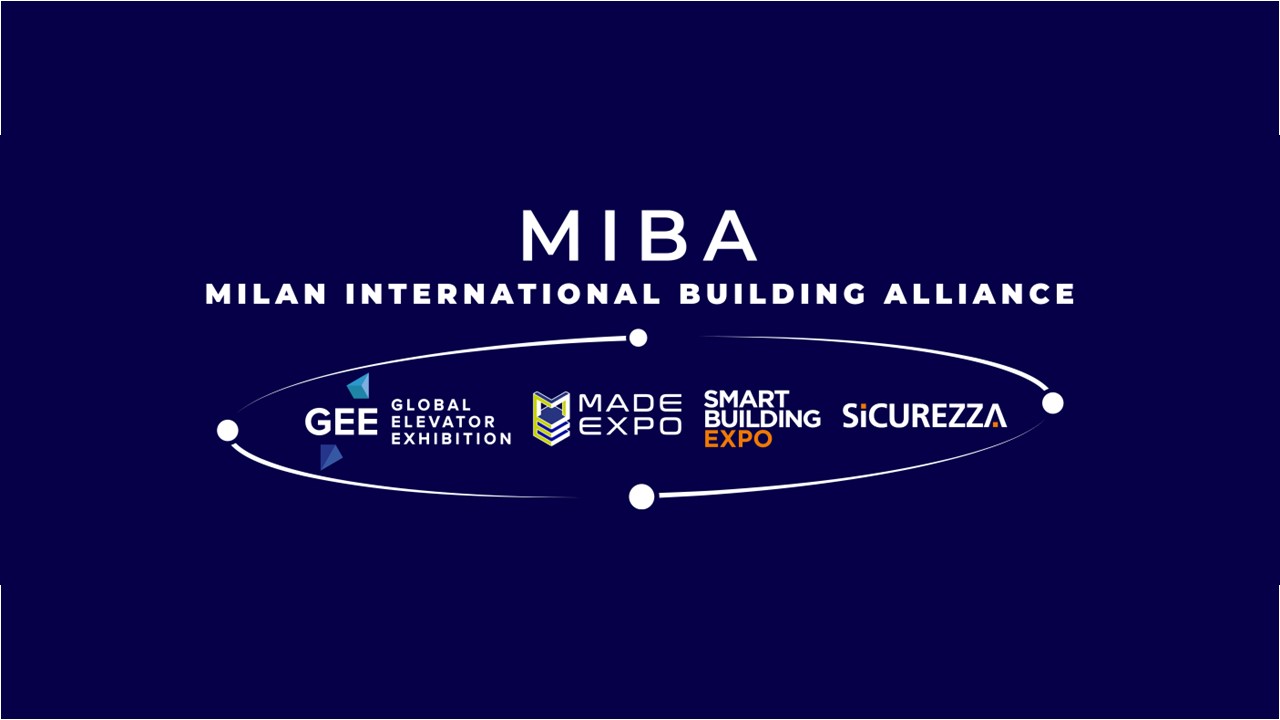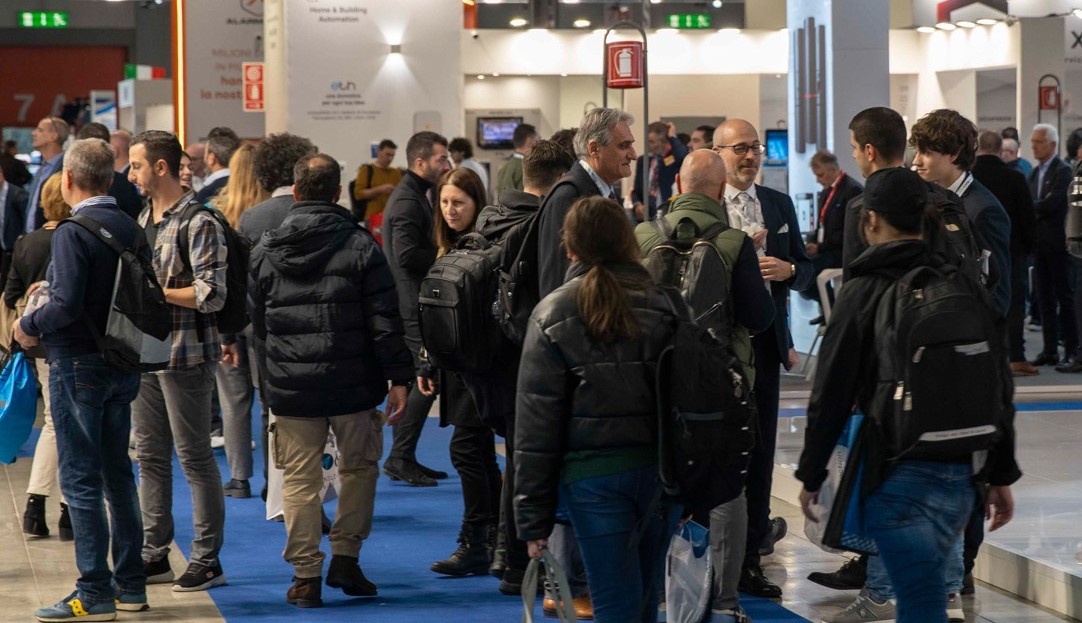The MIBA Observatory is launched, managed by the Politecnico di Milano, scientific partner of the event.
Fiera Milano, with MIBA 2025, will once again give voice to the markets and professionals responsible for achieving the ecological and digital transition of the built environment. The synergies between GEE - Global Elevator Exhibition, the fair for horizontal and vertical mobility; MADE Expo, the leading event for the construction sector; SMART BUILDING EXPO, the event for technological integration; and SICUREZZA, the reference fair for security & fire, will continue at Fiera Milano in November 2025.
MIBA will create its first spin-off in Bari, with MIBA Levante, in 2026.
Milan, 6 December 2024 – The construction industry, along with all sectors involved in new builds, renovations, and maintenance, is facing an epochal challenge: the twin transitions of ecological and digital transformation, along with emission reduction.
The time is now critical. The Energy Performance of Buildings Directive (EPBD) requires new buildings to transition from nearly zero-energy levels to zero emissions by 2030, while existing buildings must significantly reduce both energy consumption and emissions over the same period. Renovation work on building envelopes, systems, and technologies is not only necessary but a key driver for growth across all sectors, which will have the opportunity to discuss these topics at MIBA - Milan International Building Alliance 2025, the international hub for building and city design, construction, and renovation.
From November 19 to 21, 2025, Fiera Milano will once again host the simultaneous events GEE - Global Elevator Exhibition, dedicated to vertical and horizontal mobility; MADE Expo, the international event for innovative and sustainable construction solutions and building envelopes (which will run for one additional day, closing on November 22); SBE - SMART BUILDING EXPO, the reference event for home and building automation and technological integration; and SICUREZZA, Italy's leading event and one of the most important in Europe for security & fire.
THE SCENARIO
As is well known, the construction sector has undergone a significant transformation since the pandemic. According to preliminary data from CRESME - the Italian research company specialized in construction and territorial development which will provide expertise for Fiera Milano in identifying market trends - investments in Italy are expected to decline by 4.2% in 2024 compared to the previous year, a less significant drop than expected, while the downturn will continue into 2025 (-6.2%). The construction market, after the boom years of 2021-2023, is seeing a contraction due to the exhaustion of the "superbonus" push. However, it is being supported by public works expenditure, which is expected to grow by 13.7% in 2024. Despite the contraction, the Italian construction market seems to have made a significant leap compared to pre-pandemic levels, with the value of production in 2025 expected to be 20% higher than in 2019.
MARKET OUTLOOK: THE MIBA OBSERVATORY
To provide concrete support to the market and industry professionals, Fiera Milano has appointed Politecnico di Milano as the scientific partner of MIBA to create an Observatory that will analyze scenarios and trends, with the goal of focusing on key development areas. The first study from the Observatory, presented today, focuses on the Energy Performance of Buildings Directive and its potential impact on various sectors represented by MIBA: building envelopes, materials, systems, energy, and technologies.
Specifically, since energy renovations alongside building renovation/maintenance are the main drivers for the construction sector, it is clear that the future of the sector is inextricably linked to the technical, economic, and regulatory measures that will be implemented to ensure not only stabilization but also growth.
In this regard, the Renovation Wave, the European Commission's strategy aimed at improving the energy efficiency of buildings (which currently account for 40% of emissions and nearly 50% of energy consumption), can serve as the primary stimulus for the renovation of buildings, with the aim of reducing their environmental impact and increasing their resilience to climate change. The final goal is to have buildings and cities that meet modern standards of sustainability, efficiency, comfort, functionality, security, and accessibility.
This is an extremely challenging time for construction professionals: today, 75% of Italy's building stock is energy-inefficient, and more than 85% of buildings in 2050 are likely to still be in use.
This immense stock, which will require renovation once the era of the Superbonus and the National Recovery and Resilience Plan have passed, could become the true leverage for Italian market stability, growth, and development.
As the national implementing decrees for fourth update to the Energy Performance of Buildings Directive (EPBD IV) are still being defined, the MIBA Observatory, managed by the Department of Architecture and Building Engineering of Politecnico di Milano, has developed three hypothetical scenarios for the period 2025-2035, predicting different levels of investment and potential savings.
The three scenarios – a conservative one (Business As Usual - BAU), one in line with the EPBD objectives (Policy Driven), and an ambitious one (Ambitious) – assume different levels of spending on energy renovation projects, in addition to the fixed annual investments expected for renovation/maintenance, which are assumed to occur regardless of the implementation of the Directive and remain stable at pre-Superbonus levels.
1 - In the Business-As-Usual scenario, a limited implementation of the EPBD principles is expected, which will primarily serve to counteract the market contraction that would occur in the absence of clear regulatory requirements at the EU level. Under this scenario, investments in energy-efficient retrofitting are anticipated to follow a trend similar to that achieved through the Ecobonus initiative, amounting to approximately €3,700 million/year for the residential sector. This is expected to result in an additional energy savings (relative to the level achieved in 2024) of about 15,500 GWh/year by 2035. Combined with the 30,000 GWh/year achieved by the end of 2024 compared to 2020, this will account for 65% of the savings required by the EPBD by 2035. Additionally, investments in energy retrofitting for non-residential buildings, estimated at €700 million/year (yielding energy savings of 2,800 GWh/year by 2035), along with conventional renovation/maintenance activities (not specifically aimed at energy efficiency), contribute to a total business volume of approximately €84,000 million/year.
2 - In the Policy-Driven scenario, market evolution is assumed to be effectively guided by the prompt and robust application of the EPBD. For the residential sector, additional energy savings (relative to 2024) are projected to reach at least 40,000 GWh/year by 2035. Achieving this will require an average annual investment of around €10,000 million in energy retrofitting during 2025–2035. For the non-residential sector, investments needed to achieve the energy savings target (estimated at approximately 22,000 GWh/year by 2035) are projected at €5,500 million/year. Altogether, for the entire existing building stock, including conventional renovations/maintenance, the total business volume is expected to reach €95,500 million/year, representing a 13% increase compared to the BAU scenario.
3 - The Ambitious scenario, the most challenging of the three, assumes that the full potential of the EPBD is leveraged to achieve a higher rate of retrofitting than the minimum required. This outcome would likely be enabled by several factors, including heightened market awareness of energy and environmental issues (and their economic implications), greater state incentives, a clear and streamlined regulatory framework, and the absence of speculative phenomena driving up costs. Under this scenario, average annual investments of approximately €14,500 million in the residential sector (resulting in 58,000 GWh/year of energy savings by 2035) and an additional €8,000 million/year for the non-residential sector (yielding 33,000 GWh/year of savings by 2035) are projected. Including conventional renovations/maintenance, the total business volume for the existing building stock is estimated at €102,500 million/year, reflecting a 22% increase compared to the BAU scenario.
THE MIBA PROJECT
In this evolving context, MIBA – Milan International Building Alliance – with its cross-sector approach, will offer a comprehensive view of materials, products, technologies, processes, and solutions involved in creating environmentally friendly, smart, safe, and accessible buildings and cities.
Thanks to the synergy of four fairs dedicated to vertical markets – GEE - Global Elevator Exhibition, MADE Expo, SMART BUILDING EXPO, and SICUREZZA – MIBA 2025 will provide a unique opportunity for professionals and companies to experience firsthand technological and material innovations and develop the integrated, holistic approach required by today's market and clients.
- GEE, GLOBAL ELEVATOR EXHIBITION: over €2.9 billion – that’s the value of the elevator and escalator market in Italy, which experienced a 9.5% growth between 2022 and 2023. This figure, derived from the latest annual report by ANIE (the association representing Italian electronic and electrotechnical companies), highlights how demand has continued to benefit from the expanding construction sector even in recent times. GEE, the Global Elevator Exhibition, focuses on these industries. Trends, innovation, technology, and sustainability will take center stage in the next edition. GEE also boasts prestigious partners such as ANACAM (Italianh Association of Elevator Construction and Maintenance Companies), reflecting a shared commitment to facilitating networking among participants and fostering new opportunities for collaboration and growth for the companies involved.
- MADE EXPO: at a critical time for the sector, marked by regulatory changes and new economic challenges, MADE Expo, organized by Fiera Milano and MADE Eventi, provides a unique platform to meet the most innovative companies and explore cutting-edge solutions. It aims to serve as a benchmark for understanding and addressing these challenges, offering a comprehensive overview of opportunities for the sector's revival. Divided into two main sections, Construction and Envelope, MADE Expo 2025 will showcase the latest technologies, innovative materials, and sustainable solutions to enhance building comfort and safety. The event will focus on key themes such as digitization in construction, redevelopment, and structural safety—central topics for the future of Italy's real estate assets. MADE Expo 2025 will also be an opportunity for professionals to exchange ideas and gain training, featuring a rich program of conferences and workshops. Among its highlights, the third edition of the MADE Awards will be organized for the first time by the Politecnico di Milano.
- SMART BUILDING EXPO: the home and building automation and technological integration exhibition, organized by Fiera Milano and Pentastudio, is the go-to trade fair for the entire supply chain of the electrical-electronic and home/building automation sector. This sector is poised to lead the electrification and decarbonization of buildings under EPBD IV. In Italy, this industry comprises over 66,000 companies with 251,000 employees, generating €21.8 billion in production value in 2023, with an average annual growth rate of 9.4% (ANIE-CRESME data). In this challenging context, SMART BUILDING EXPO will present a future that is already taking shape, emphasizing the need for a qualified networking platform for all involved operators. The event will focus on innovations enabling the smart evolution of buildings and cities: renewable energy, control and management platforms, network infrastructure and connectivity, home and building automation, electrification of systems and buildings, smart lighting, and e-mobility infrastructure. The format will include "innovation plazas", offering in-depth discussions and expert talks on topics ranging from building technology architecture to system integration, with special attention to energy themes. Additionally, high-innovation special events will be held in collaboration with key industry associations and professional orders.
- SICUREZZA: dedicated to the security and fire prevention sectors, it is preparing to reaffirm its role as a unique event in Italy and one of the leading ones in Europe. According to the latest ANIE SICUREZZA data, the Security and Building Automation sector continued its growth trajectory in 2023, which began post-pandemic (+11.7% annual variation in aggregated turnover at current values). However, companies now face a significant challenge: quickly adapting to effectively manage new EU regulations such as NIS2, CER, and CRA, aimed at strengthening cybersecurity resilience and risk management across member states. SICUREZZA 2025: will serve as a litmus test to understand how the market, one year after the implementation of the new regulations, has adapted to these changes while showcasing the sector's excellence in security and fire prevention. The event will highlight the evolution of a sector deeply rooted in research and innovation, supporting companies through this transformation process. With contributions from leading European and global manufacturers, participants will gain insights into increasingly tailored solutions for diverse applications, enhanced by AI, which is revolutionizing how threats are addressed, improving systems' effectiveness, speed, and precision. A comprehensive training program will also be integral to SICUREZZA, providing professionals with tools to navigate this period of great change.
THE ROLE OF EXPERTISE
MIBA will offer industry operators a highly innovative showcase of materials, products, and solutions for efficient, sustainable, secure, and accessible buildings.
Enriching the program will be a wide range of conferences, seminars, and workshops organized around the three main themes identified in the previous edition: sustainability, innovation, and regulations. Alongside cross-cutting events, each trade show will offer targeted sessions for technicians and professionals, ensuring comprehensive coverage of the hottest topics in building design, construction, and management.
MIBA EXPANDS BEYOND MILAN: MIBA LEVANTE
To better serve the market and meet operators in their region, Fiera Milano is working on a MIBA spin-off scheduled to take place in Bari in November 2026.
MIBA Levante will alternate with the Milan event, held in odd years. This new initiative aims to bridge the two MIBA editions while providing Southern Italian professionals with an opportunity for updates and discussions.





